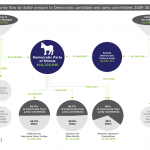by Tony Glosson
A recent lawsuit filed by Illinois-based Liberty Justice Center poses an interesting question for campaign finance law: Should legislators be allowed to exempt their own party committees and leaders from limitations placed on contributions to candidates? The complaint, filed on behalf of Illinois Liberty PAC and amended to include a private citizen, alleges that Illinois Public Act 96-832 “…treats Illinois Liberty PAC and other nonparty speakers differently from similarly situated political parties” and that “this disparate treatment burdens Illinois Liberty PAC’s First Amendment rights to free speech and equal protection guaranteed by the Fourteenth Amendment…”
The act in question stipulates that during a general election period, individuals may contribute up to $5,000; unions and corporations may contribute $10,000; and political action committees are capped at $50,000. Political party committees, however, are not limited at all. The act expressly allows party leaders, who may serve as treasurers of their own candidate committees, to contribute unlimited amounts of money from their candidate committee to the party committee they chair, and from there, direct the funds to other candidates. During primary elections, similar disproportionalities exist.
Illinois Liberty PAC , along with co-plaintiff Edgar Bachrach, argues in the complaint that since Illinois Speaker of the House Mike Madigan may make unlimited contributions while ILP and Bachrach are limited at $50,000 and $5,000 respectively, the act violates equal protection. To illustrate the situation, Liberty Justice Center released the following graphics detailing the cash flow from political parties to candidates, as compared to funds received from all other sources:
The data featured in the images demonstrate that parties are able to singlehandedly match or exceed contributions from all other sources of funding combined, and that much of the money available for disbursal came from the respective committee chairs’ self-directed candidate committee funds. Or, to put it more simply, party leaders may contribute as much as they desire to any particular candidate while all other Illinois citizens are limited to $5,000 per election.
Dan Proft, the chairman of ILP and a former Illinois gubernatorial candidate, said that the lawsuit was filed to ensure, “We don’t have one set of rules . . . for party bosses and another set for the rest of the state.” However, Illinois Campaign for Political Reform, a liberal interest group out of Chicago, claims that if the lawsuit succeeds, it would lead to a “return to the bad old days of Blagojevich-style shake downs and pay-offs disguised as campaign contributions.”
In any case, it will be interesting to see how the lawsuit fares over the next several months. In the interest of full disclosure, I interned with the Illinois Policy Institute, a non-partisan thinktank affiliated with the Liberty Justice Center. Working there I saw in more detail than ever before what just about any (non-politician) Illinoisan will tell you: Illinois needs to put its laws back to work to secure freedom and prosperity for the ordinary citizens of Illinois, not just for those in power.
Tony Glosson is a first-year law student at William & Mary.
permalink: http://stateofelections.pages.wm.edu/2012/09/22/illinois-party-leaders/

